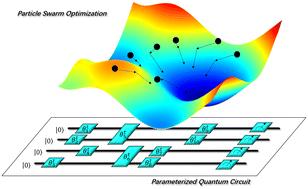当前位置:
X-MOL 学术
›
Phys. Chem. Chem. Phys.
›
论文详情
Our official English website, www.x-mol.net, welcomes your
feedback! (Note: you will need to create a separate account there.)
Particle swarm optimization for a variational quantum eigensolver
Physical Chemistry Chemical Physics ( IF 2.9 ) Pub Date : 2024-11-05 , DOI: 10.1039/d4cp02021a Hao Mei, Jianyu Zhao, Qing-Song Li, Zhao-Yun Chen, Jing-Jing Zhang, Qingchun Wang, Yu-Chun Wu, Guo-Ping Guo
Physical Chemistry Chemical Physics ( IF 2.9 ) Pub Date : 2024-11-05 , DOI: 10.1039/d4cp02021a Hao Mei, Jianyu Zhao, Qing-Song Li, Zhao-Yun Chen, Jing-Jing Zhang, Qingchun Wang, Yu-Chun Wu, Guo-Ping Guo

|
In the field of finding ground and excited states, where quantum computation holds significant promise, using a variational quantum eigensolver (VQE) is a typical approach. However, the success of this approach is vulnerable to two factors: classical optimization for the ansätz parameters and noise from quantum devices. To address these challenges, we adopted particle swarm optimization (PSO) based on swarm intelligence for VQE and presented its performance. Furthermore, a modified PSO, gradient-based adaptive quantum-behaved particle swarm optimization (GAQPSO), is proposed. This algorithm adaptively upgrades parameters based on gradients or shared information within the swarm, enhancing optimization capability and noise resistance. We tested this algorithm using VQE simulations on several molecular systems with different geometries and found that, when using random initial values, GAQPSO achieves accurate results even in the presence of noise, whereas traditional PSO, QPSO, COBYLA, and gradient-based algorithms (GD and L-BFGS-B) fail. The GAQPSO algorithm presents a novel approach to optimizing VQE, demonstrating superior performance in parameter optimization and noise resilience compared to traditional optimization algorithms. This effectively advances the process of achieving a quantum advantage for quantum computing in quantum chemistry problems.
中文翻译:

变分量子特征求解器的粒子群优化
在寻找基态和激发态的领域,量子计算具有重大前景,使用变分量子特征求解器 (VQE) 是一种典型的方法。然而,这种方法的成功容易受到两个因素的影响:ansätz 参数的经典优化和量子器件的噪声。为了应对这些挑战,我们采用了基于群体智能的粒子群优化 (PSO) 进行 VQE 并展示了其性能。此外,还提出了一种改进的 PSO,基于梯度的自适应量子行为粒子群优化 (GAQPSO)。该算法根据梯度或群内的共享信息自适应地升级参数,从而增强优化能力和抗噪声能力。我们在具有不同几何形状的几个分子系统上使用 VQE 模拟测试了该算法,发现当使用随机初始值时,GAQPSO 即使在存在噪声的情况下也能获得准确的结果,而传统的 PSO、QPSO、COBYLA 和基于梯度的算法(GD 和 L-BFGS-B)则无法实现。GAQPSO 算法提供了一种优化 VQE 的新方法,与传统优化算法相比,在参数优化和噪声弹性方面表现出卓越的性能。这有效地推进了在量子化学问题中实现量子计算的量子优势的过程。
更新日期:2024-11-05
中文翻译:

变分量子特征求解器的粒子群优化
在寻找基态和激发态的领域,量子计算具有重大前景,使用变分量子特征求解器 (VQE) 是一种典型的方法。然而,这种方法的成功容易受到两个因素的影响:ansätz 参数的经典优化和量子器件的噪声。为了应对这些挑战,我们采用了基于群体智能的粒子群优化 (PSO) 进行 VQE 并展示了其性能。此外,还提出了一种改进的 PSO,基于梯度的自适应量子行为粒子群优化 (GAQPSO)。该算法根据梯度或群内的共享信息自适应地升级参数,从而增强优化能力和抗噪声能力。我们在具有不同几何形状的几个分子系统上使用 VQE 模拟测试了该算法,发现当使用随机初始值时,GAQPSO 即使在存在噪声的情况下也能获得准确的结果,而传统的 PSO、QPSO、COBYLA 和基于梯度的算法(GD 和 L-BFGS-B)则无法实现。GAQPSO 算法提供了一种优化 VQE 的新方法,与传统优化算法相比,在参数优化和噪声弹性方面表现出卓越的性能。这有效地推进了在量子化学问题中实现量子计算的量子优势的过程。


















































 京公网安备 11010802027423号
京公网安备 11010802027423号